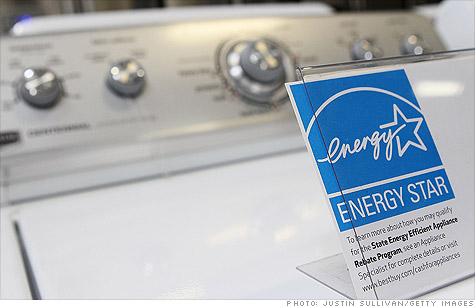Search News

NEW YORK (CNNMoney.com) -- Americans aren't known for their energy-thrift ways. Maybe that's because they have little idea as to how much energy things use.
While people are generally able to rank items according to energy use - i.e. the dryer uses more than the toaster - they are way off the mark when it comes to gauging by just how much, according to a recent study from researchers at Columbia University and elsewhere.
Example: Most people knew that a laptop computer uses less energy than a desktop. But few knew the laptop used one-third the amount.
Nearly 20% said that turning off the lights was the biggest thing they could do to save energy. In reality, turning off the lights saves just a small amount of energy compared to things like insulating your house or buying more efficient appliances.
"People's perceptions were off by an order of magnitude," said Shahzeen Attari, one of the study's authors and a fellow at the a Columbia's Earth Institute and Center for Research on Environmental Decisions. "Correcting perceptions is critical if people are going to make informed decisions."
Americans tended to slightly overestimate how much energy small things like lights and laptops use, and greatly underestimate how much is consumed by big items like dishwashers and air conditioners.
They also tended to say that curtailment activities - not using the lights, not using the car - had more of an effect than investing in more efficient items.
"It's what they can do now, and it's easier to incorporate that without an up-front cost," said Attari.
Also surprising: the study found that people who said they practiced conservation fared worse on the quiz than the public at large.
The study has generated some controversy in the environmental community online, with some questioning the numbers Attari used to decide what activity saved more energy.
She has posted detailed links to the information used in her study, although she conceded that there are lots of assumptions that go into the numbers.
A native of Dubai who studied engineering in college, Attari said she is now focused on the intersection of engineering and psychology as a better means of enabling the public to take advantage of scientific advances to curb greenhouse gas emissions.
"We study the engineered system, but we don't study how people interact with it," she said. She stressed her study isn't meant to suggest people stop doing things like turning off the lights, but rather also look to other areas where there could be even more energy savings.
"We need both, curtailment and energy efficiency," she said. ![]()






| Index | Last | Change | % Change |
|---|---|---|---|
| Dow | 32,627.97 | -234.33 | -0.71% |
| Nasdaq | 13,215.24 | 99.07 | 0.76% |
| S&P 500 | 3,913.10 | -2.36 | -0.06% |
| Treasuries | 1.73 | 0.00 | 0.12% |
| Company | Price | Change | % Change |
|---|---|---|---|
| Ford Motor Co | 8.29 | 0.05 | 0.61% |
| Advanced Micro Devic... | 54.59 | 0.70 | 1.30% |
| Cisco Systems Inc | 47.49 | -2.44 | -4.89% |
| General Electric Co | 13.00 | -0.16 | -1.22% |
| Kraft Heinz Co | 27.84 | -2.20 | -7.32% |
|
Bankrupt toy retailer tells bankruptcy court it is looking at possibly reviving the Toys 'R' Us and Babies 'R' Us brands. More |
Land O'Lakes CEO Beth Ford charts her career path, from her first job to becoming the first openly gay CEO at a Fortune 500 company in an interview with CNN's Boss Files. More |
Honda and General Motors are creating a new generation of fully autonomous vehicles. More |
In 1998, Ntsiki Biyela won a scholarship to study wine making. Now she's about to launch her own brand. More |
Whether you hedge inflation or look for a return that outpaces inflation, here's how to prepare. More |